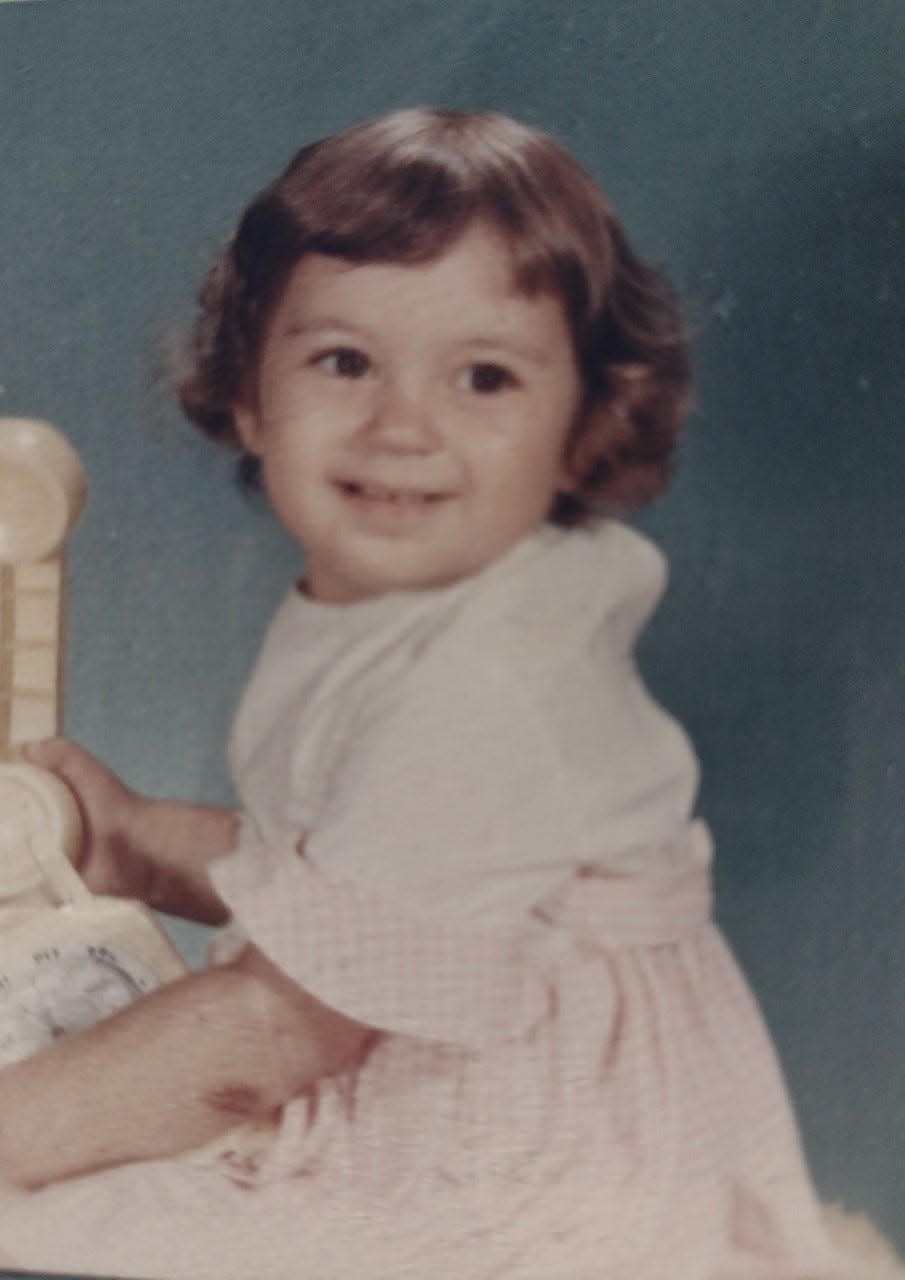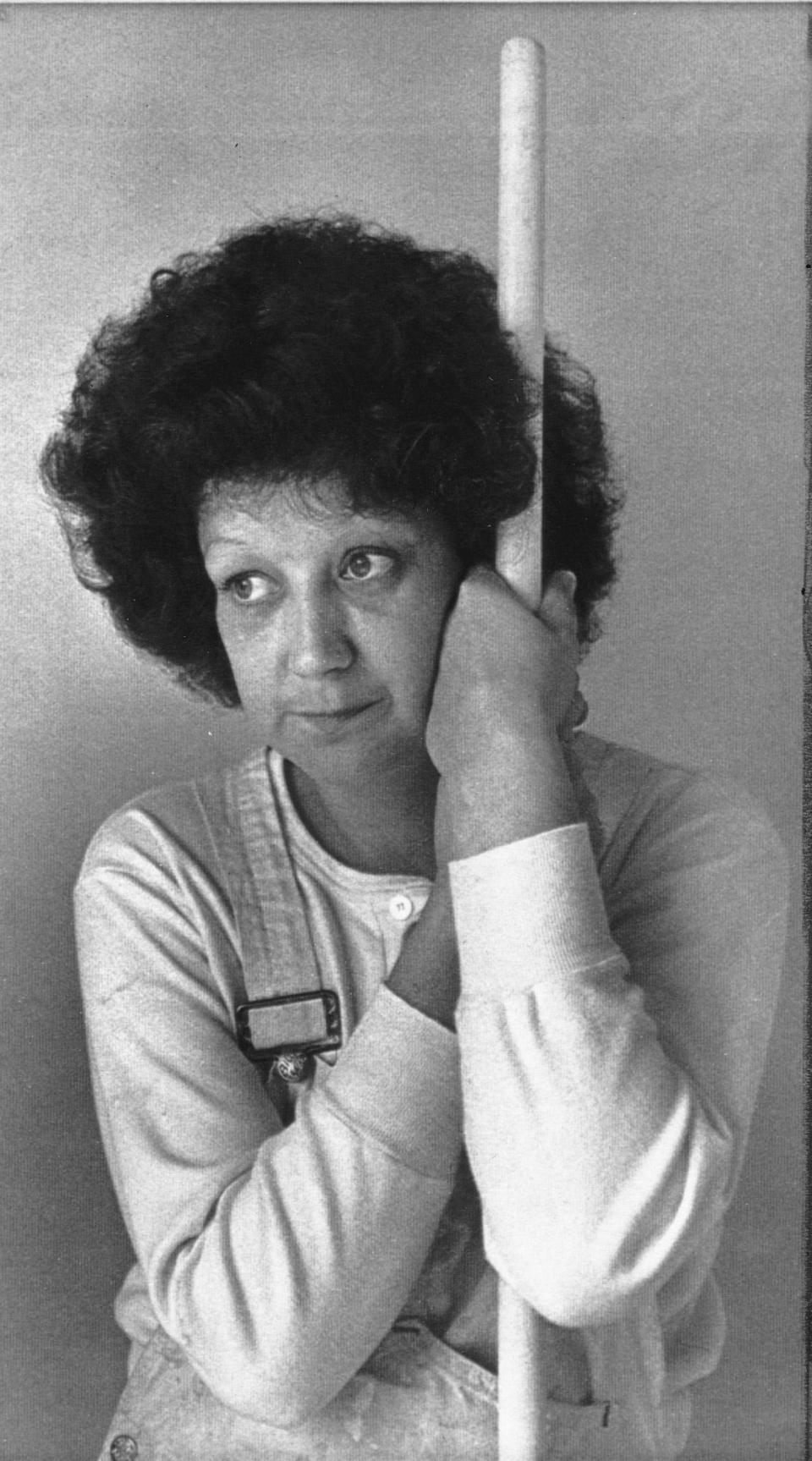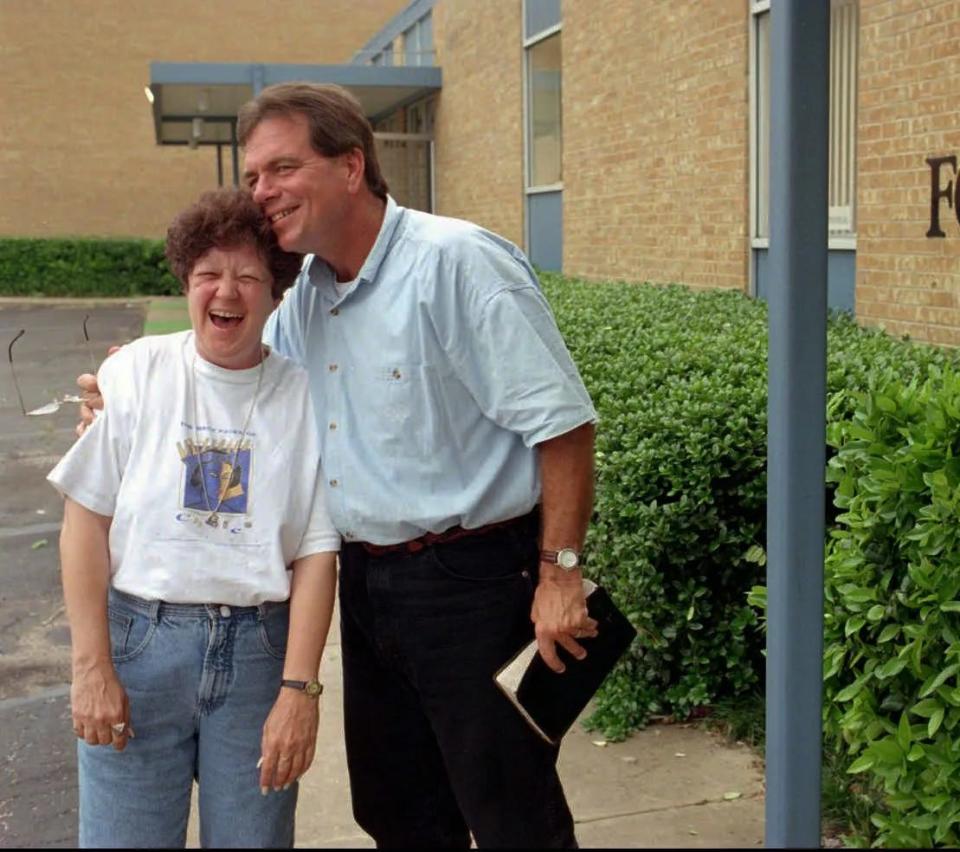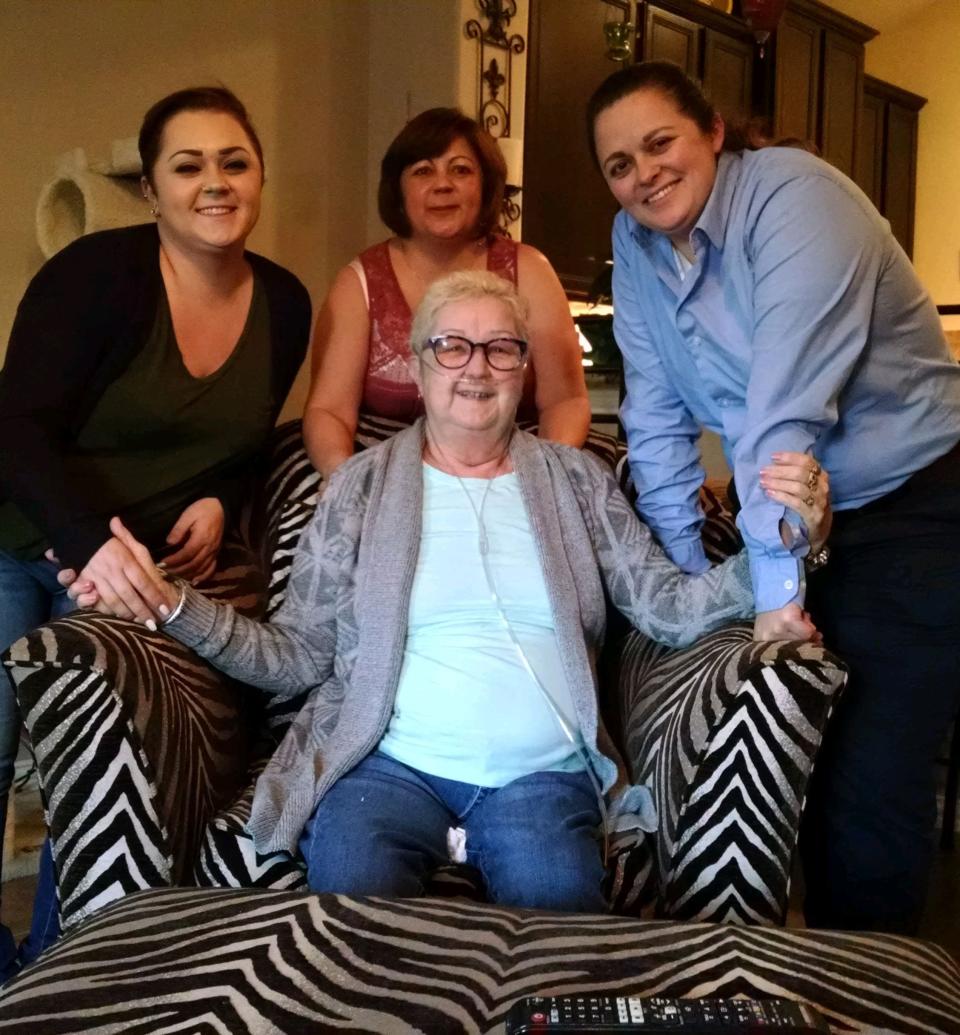Jane Roe's conflicted existence: Sex, religion and the daughter she left behind
Norma McCorvey always loved a good party.
She had gotten all dolled up that night. Dressed in a long black velour dress, topped with a black vest embroidered with tiny red and purple flowers, and in her signature suede boots, McCorvey made her way through the mansion with the double staircase.
McCorvey, then 28 years old, said hello to every person in a suit and tie. Colorful abortion rights buttons and memorabilia covered a table at the entrance. Music played in the background.
The year was 1975, two years after the Supreme Court had passed the landmark Roe v. Wade decision that gave people the constitutional right to an abortion. The key plaintiff of the case was McCorvey, known by her pseudonym, Jane Roe.
But to the 10-year-old girl standing beside McCorvey, she was Mom.
Mostly Melissa Mills stayed quiet. When the adults in the room did ask about school and life with the famous abortion activist, she told them she loved art and decoupage projects with her mother.

Throughout the past half century, no other controversial issue has touched, united and divided more families in the United States than abortion. But perhaps never as intimately as for McCorvey's eldest daughter, who grew up in the shadow of Jane Roe.
Mills, the only child McCorvey would have a lifelong relationship with, described her mother as a tumultuous figure, first as an abortion rights activist and later a born-again Christian and anti-abortion crusader until her death in 2017.
With her mother always looming large, Mills, now 56, chose a quiet existence devoted to others. She became a pediatric nurse, married twice and raised two daughters on a quiet suburban street in Katy, Texas. Her only dream was to have a family of her own. She made sure to be soft-spoken, dependable and accountable, everything she wanted in a mother as a child, everything her mother was not.
"I think more about her now, and I talk more about her now than I ever did growing up," Mills told USA TODAY in an exclusive interview. "Now I live Norma every day. Everything's about the things that have happened in the past and everything happening now."
Mills said she was in shock when she got a text message this month informing her of the leaked draft opinion from the Supreme Court signaling that the court is poised to overturn the landmark decision in her mother’s case. Mills had thought it would always be the law of the land.
In many ways, Mills' unique perspective into McCorvey’s life is representative of the nation's greater debate surrounding abortion, said Joshua Prager, who spent 11 years working on his book "The Family Roe: An American Story," which was based on many interviews with McCorvey.
American attitudes are more nuanced than what is often represented by either supporters and opponents of abortion rights. For nearly five decades, more than half of the nation has said abortion should be legal – to a point – as McCorvey did.
"Norma was a perfect person to examine the larger story of abortion in America, because the very same things that have made abortion so fraught in this country made abortion fraught for Norma," Prager said. "It was the seeming irreconcilability of sex and religion."
Norma McCorvey never wanted to be a mother
As a child, Mills often thought of McCorvey as an older sister. Mary Sandefur, her grandmother and McCorvey's mother, raised her as her own.
"I would see her once or twice a year, sometimes not," Mills said. "She would just come in once in a while, stay a day or two or three. And then she'd party a little bit and then she'd leave again."
Born in Louisiana, McCorvey grew up in Texas and was raised a strict Jehovah's Witness.

According to multiple accounts, when she told her mother as a teenager that she was attracted to women, she beat her.
By the time McCorvey was 17, she had run away from home, amassed a rap sheet that included solicitation, been sent to a reform school, gotten married and divorced – and given birth to Mills.
Within six weeks of Mills' birth in 1965, McCorvey was back to living with her parents and serving drinks at a local bar in Dallas. Mills' birth father did not stick around.
When her daughter was about 4 months old, McCorvey met and moved in with her girlfriend, Diane Watrous, who went by Hyman. She took the baby with her.
McCorvey changed jobs – but not diapers, Watrous recalled.
"Norma didn't want to get up and take care of Melissa in the middle of the night or anything," said Watrous, now 80. "So I would usually get up when she wanted a bottle or was wet and had to be changed."
Eventually, although her girlfriend wanted to keep the baby, McCorvey asked her mother to take Mills back.
"She was cute. I loved Melissa," Watrous said. "But we were young and she was better off with her grandmother."
After McCorvey surrendered custody of Mills when she was almost a year old, the grandparents moved back to Louisiana, where Mills would grow up.
"Norma wasn't ready to be a mother. She was so young," Mills said. "Well – I don't really know if Norma ever wanted to be a mother."
For McCorvey, things ended with Watrous after she cheated on her with a male orderly and got pregnant a second time in 1967. After losing Watrous and her job, she went back to pouring drinks, this time at the White Carriage lesbian pub.
Andi Taylor, 78, who now lives in Stamford, Texas, worked with McCorvey. She said McCorvey would go on and on about Mills, how she was living with her mother until she was ready but said she was always planning on "giving up baby No. 2."
After McCorvey gave birth to her second child, she put Mills' half-sister up for adoption.
"I can tell you she was never the same after she gave up that baby," Taylor said. "She didn't show it, because that's how Norma was."
In 1970, McCorvey became pregnant a third time. McCorvey sought to terminate her pregnancy. But she could not legally do so under the abortion ban at the time in Texas.
“I felt there was no one in the world who could help me,” she told the Southern Baptist Convention news service in 1973.
After a series of failed attempts to get an illegal abortion through a network of doctors, McCorvey was introduced to Sarah Weddington, a local lawyer who was looking for a plaintiff for a suit to challenge the Texas law.
What started with a $15 court filing fee changed the country.
But McCorvey never got the abortion. Instead, she gave birth later that year, nearly three years before the final decision came down in 1973.
Living with Jane Roe as a teenager in the abortion movement
It was either a "breakfast day" or chicken chow mein. Those were the only two dinner options available.
It was 1975. Mills was 10 years old. She had gone to live with McCorvey and her mother's partner, Connie Gonzalez, in Dallas.
McCorvey was a property manager for a few buildings in Dallas and Gonzalez would do all the maintenance.
For the year Mills spent with them, she lived in two very different worlds.

On the good days, McCorvey would tell her to put on her Pink Panther costume and gather some neighborhood kids to reenact some of her favorite episodes of the cartoon show in the living room.
She never cooked – that was all Gonzalez, Mills said. McCorvey's job was the fun.
She loved taking Mills to amusement parks. One time, she wore a wig made of black artificial hair to Six Flags. McCorvey was smoking on the ride, and the wig caught fire before flying off of the red and yellow Tilt-A-Whirl.
Mills couldn't stop laughing.
"She started hollering and screaming, and they had to stop that thing. We had to get off and her hair was all messed up," Mills said. "Stuff like that was always happening with her."
Mills remembered how excited McCorvey would get when dressing up to go to a fancy party "with all the lawyers" who were continuing to fight for abortion rights.
As soon as McCorvey entered, she was Jane Roe once more.
But there was always a downside. Mills said McCorvey struggled with alcohol, pills and other mental health problems.
She would often smoke and drink with her lawyer friends when they came around, Mills said.
"Everything you did was a party, and when you take the time period that they were living in with an enormous group, it was free-for-all, pretty much with everything," Mills said.
Without warning, Mills said, McCorvey would become belligerent, disappear for a few days or pass out, which scared Mills.
As a little girl, she felt responsible. McCorvey was always at her best when she was the life of the party, never at home.
"I felt like I was always putting her through a lot to be around her. That's the way I felt," Mills said.
In her stupor, Mills said, McCorvey would go on rants about her mother having taken Mills away. She would become furious, and anything could set her off.
The last time McCorvey nearly overdosed, she was out for three days. The next day, Mills called her grandmother to come fetch her.
When Sandefur and her husband arrived, McCorvey told her girlfriend to pull a gun on her parents. Mills said her mom pulled out a crochet hook and tried to stab her grandmother.
Mills settled back down in Louisiana. A year and a half passed before she saw her mother again.
As a teenager, Mills spent more time with her mother, often at amusement parks. One time McCorvey picked her up in a motor home and drove to Colorado so Mills could see the Bee Gees in concert.
"It was easier as I got older because she could relate to me and didn't have to care for me," Mills said.
By then, it was the late 1980s. With the help of attorney Gloria Allred, McCorvey was speaking at rallies and making media appearances for the women's movement. McCorvey was even paid as a consultant for the production of a 1989 Emmy-winning Hollywood movie named after the Supreme Court decision.
McCorvey had become a pop icon and an inspiration to many, said Charlotte Taft, an abortion counselor and founder at the now-shuttered Routh Street Women's Clinic in Dallas where McCorvey worked the phones.
But there were fissures, said Prager, the biographer behind "The Family Roe."
“The truth is that they didn't treat her very well," Prager said.
The movement had kept McCorvey at arm's length because of her mercurial nature. She had spun elaborate stories that were untrue, the most famous being that she had testified under oath that she sought an abortion because she had been gang-raped. In 1987, she told a Dallas paper she had lied.
Activists were furious and tried to have McCorvey dimmed from the spotlight.
"Norma was always going on about something that had happened," Mills said. "They used her."
But others said there were other reasons for the discord between McCorvey and many abortion rights activists, including a significant class difference between McCorvey and the other leaders of the movement. McCorvey had not finished high school. She was poor. She had been a prostitute.
When time came to file the class-action lawsuit, lawyers needed someone who didn't have the financial means to get an abortion.
"It had to be a pregnant woman who literally did not have the means, couldn't get her friends together to sell the car to get a bus ticket or a train ticket to New York to get an abortion," Taft said.
And while finding a woman who needed an abortion in Texas was easy, finding a woman who was willing to speak about it and file a lawsuit was not.
The movement wanted a plaintiff, a pseudonym and a figurehead. Never a spokesperson.
But McCorvey refused. She wanted to be the face. She wanted to have a voice.
She was equal parts rugged and magnetic; she didn't care about etiquette and asked inappropriate questions. In the same conversation, she would make a person feel as if she were their best friend within minutes. And people loved her for it.
"Women got up, would go up and thank her. They thanked her as if she were the reason that they had the ability to have an abortion," Taft said.
Switching sides of the abortion debate
In August 1995, McCorvey did an about-face on national television when she converted to evangelical Christianity and renounced her beliefs. She was baptized in a backyard swimming pool in Dallas by anti-abortion minister Flip Benham – who had protested outside a clinic where McCorvey worked for years.
Benham and McCorvey had struck a friendship.
"Flip had been a bartender, you know, he used to tell some of us, 'Oh, I was the worst sinner ever before,'" Taft said. "I think they had some things in common."
Throughout the next decades, McCorvey would go on to transform herself into a crusader for the anti-abortion cause.
Mills accompanied her mother to a rally outside Dallas. She was now seeing her protest for the other side.
"Norma was screaming and yelling at the top of her lungs, smoking and raising all kinds of hell," Mills said.

After the protest, Mills told her mother she would always support her but didn't feel comfortable going to anti-abortion rallies.
Mills said McCorvey's views on abortion never really wavered. With a few exceptions, Mills said, her mother always said abortion should be legal through the first trimester of pregnancy.
"My mom never wanted women to not have access," Mills said. "She just didn't want to see abortion abused."
In an interview for the documentary "AKA Jane Roe" made before her death in 2017, McCorvey said she had been paid to switch sides.
According to McCorvey, $456,911 was donated to her by Operation Rescue in "benevolent gifts."
Given the 22 years she was active in the anti-abortion movement, that came out to roughly $20,000 a year for denouncing her beliefs.
"She didn't make as much money as people said she did," Mills said. "She was eating potatoes and toast at the end. And eggs."
But to think McCorvey switched sides just for money would leave something terribly amiss, Mills said.
"What people don't understand is that Norma really believed she was battling for her soul," Mills said.
Having been raised in a religious fundamentalist home, there was a lot of fear. When she worked at the abortion clinic in Dallas, Mills said, the anti-abortion protesters outside the clinic “made her feel like her soul was damned because she was gay and she was the one that killed all these babies."
McCorvey also publicly renounced homosexuality, turned her life partner into her roommate and was desperately trying to get sober, Mills said.
Prager, who interviewed McCorvey over four years, said that although she did tell a lot of lies, McCorvey's internal conflict was sincere.
"Even when she becomes Jane Roe and that works for several years, she's conflicted on the side of choice. But that doesn't go away on the other side – she's just as conflicted.”
Right before her anti-abortion conversion, Mills said, her mother would go on rants related to abortion. She would say the flowers were crying and the playgrounds were empty. She felt as if not enough children were being born. She wondered if it was because of "her law," which is how McCorvey referred to Roe v. Wade.
For Mills, the part that broke her heart was watching her mom having to give up on parts of herself – and even love.
"My mom was gay, no matter what anybody says," Mills said.
“I never saw my mom with anybody again, not even Connie. But I knew my mom loved redheads."

Mills said McCorvey also ruffled religious leaders because she wouldn't always stick to the script. But the same charisma that had first put her in the national limelight was still palpable in the anti-abortion movement.
Tui Marie Curie, now 39, met McCorvey when she was doing anti-abortion activism work on her college campus.
A friendship was born.
"Norma was just special. I remember when she learned I was pregnant, she went and bought me all this baby stuff." Curie said.
The pair spoke every night until McCorvey's death.
Curie added: "Norma was so funny. It was like having a glass of wine with a friend."
Losing a mother – again
At the Mills home, abortion was seldom the topic of family discussion. Both of her daughters support abortion rights.
For Chloe Mills, 27, McCorvey was simply her outlandish grandmother.

The one who would let her stay up late and would take her to dinner at P.F. Chang's – her favorite.
It wasn't until Mills was sitting in her American history class that she realized her grandmother was Jane Roe.
"I nearly fell out of my chair. How could this be Norma?" Chloe Mills said.
When she would see McCorvey, it was always about having fun – like it was when her mother was little.
By the end of McCorvey's life, she was battling chronic obstructive pulmonary disease. McCorvey was kicked out of seven nursing homes for smoking. She got nurses fired for handing her smokes.
She moved in with Mills and her husband in 2016 for the last year of her life. It was there that Mills could finally put all the pieces of the McCorvey puzzle together. As she cared for her mother, serving her spoonfuls of ice chips or sips of soda, she discovered "Norma was just Norma," a woman with a big voice in a small town outside Dallas who had dreams but never fit quite in.
"I love Norma to death, but she tested the waters all the time," Mills said.
Hours before McCorvey died on Feb. 18, 2017, Mills kissed her cheek and told her she had been a good mother. One of McCorvey's favorites, "One Love" by Bob Marley, played in the background.

Years later, Mills honors her mother every day as she gets ready for work, adorning her ears and wrists with jewelry from her mother’s collection. One of her favorites is a green stone necklace.
Now, as a decision from the Supreme Court nears and her mother's legacy could overturned, there's a sense she's losing her mother – and what she once stood for – all over again.
"It has been so hard,” Mills said. “Mom would have hated this."
Follow national correspondent @RominaAdi on Twitter
This article originally appeared on USA TODAY: Jane Roe's daughter on her mom's views on abortion, religion, sex

 Yahoo Movies
Yahoo Movies 
